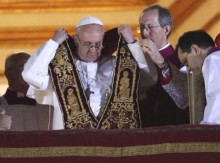Argentine cardinal from Buenos Aires, 76-year-old Jorge Mario Bergoglio became the 266th Pope of Catholic Church. It is the first time the Holy See is taken by a member of the Society of Jesus. It is also the first time in the past 1,200 years a non-European is elected the pontiff (last time it was Gregory III, who reigned in the period from 731 to 741). Incidentally, in his book Les derniers secrets du Vatican (Recent Secrets of Vatican) – its Ukrainian translation has been published by Svichado publishers – Bernard Lecomte writes that at previous conclave the new Pope competed with Joseph Aloisius Ratzinger (Benedict XVI).
Jorge Mario Bergoglio was born on December 17, 1936. He was fond of chemistry in his young years. He received a diploma of chemical technologist. Later he studied in a seminary. In 1958 he entered the Society of Jesus Order. His novitiate (the period of training for a novice monastic) took place in Chile, after which he continued his education in St. Joseph College in Buenos Aires, where he received a diploma in philosophy. He further taught this subject at religious educational institutions of the Argentine capital. In 1969 he became a priest, which marked the beginning of his more than 40 years’ long path up the stairs of the Catholic Church hierarchy.
The biography of the priest is full of episodes showing that he is a modest man who opposes luxury for clergy. So, when he became the Buenos Aires Cardinal, he refused from the modern apartment where his predecessor used to reside. He moved around the city by public transport (a photo of him traveling by subway is wandering across the Facebook network), cooked food on his own, and was a regular visitor of Buenos Aires suburbs – in his opinion, the underprivileged people inhabiting the neglected districts were in greatest need for a pastor.
Interestingly, the biography of the newly elected Pope has a Ukrainian thread. According to His Beatitude Sviatoslav (Shevchuk), who has served the longest as Greek Catholic archbishop in Argentine, the pontiff was a pupil of Ukrainian priest Stepan Czmil, buried in the St. Sophia’s basilica in Rome. (He even testified in Father Czmil’s beatification process.) “At that time the student of Salesian Society School every day early in the morning … served Father Czmil during the divine service. He used to know our devotions very well and even remembers our liturgy,” www.ugcc.org.ua (website of UGCC) quoted His Beatitude as saying. As is known, Buenos Aires archbishop was an ordinary for Eastern Catholics, therefore he and Archbishop Shevchuk have closely cooperated. A reasonable question comes up, whether Greek Catholics will be able to come to agreement with Pope Francis in resolving numerous problems. Above all, the question is receiving of a Patriarchate, recognition of beatification of Andrei Sheptytsky (2015 will mark his 150th birth anniversary), relations with Mukacheve eparchy (two Ukrainian Greek Catholic Churches exist on the territory of Ukraine, the Transcarpathian church is subordinate to Vatican), with the Orthodox community (Ukrainian Greek Catholic Church is often a stumbling block between RCC and ROC). Meanwhile, during his pastor visit to Argentina on April 12, 2011, His Beatitude Sviatoslav invited the then Cardinal Jorge Mario Bergoglio to Ukraine. “Since the new Pope has some knowledge about Ukraine and some sentimental attachment to Ukrainians, I think we can hope he will pay a visit to Ukraine,” His Beatitude Liubomyr (Huzar) admitted (www.ugcc.org.ua).
Whereas our country is still called Christian, Europe is gradually becoming more secular. Besides, according to sociological stats, in 2030 its population will make only eight percent of the entire population of the globe. Already today over 80 percent of Catholics reside beyond the Old Continent: in Latin America, Africa, and Asia. Religion expert Viktor YELENSKY considers that the demand for religion has exhausted in Europe, however many people need a living God, whom priests cannot give. Head of Religion-Information Service of Ukraine Taras ANTOSHEVSKY agrees:
“I think the newly elected Pope will consolidate everyone around the questions of faith, all the more so his predecessor announced 2013 the Year of Faith. And faith envisages broaching moral-ethical problems, such as the problems of social justice. Apparently, he will take an active interest in the third world countries – it is not without a reason that Bergoglio chose the name of one of the greatest Catholic saints, Francis from Assisi. The spiritual calling of Francis from Assisi was marked by reorientation of the regular clergy from closed to open life, namely serving people. In his time the property of the Franciscan Order became property of the Pope, and the Franciscan brothers started to lead ascetic lifestyle.” Antoshevsky went on, “As is known, Pope Francis previously opposed abortions, euthanasia, and legalization of unisexual marriages. He will continue to do so in his support of life.”








